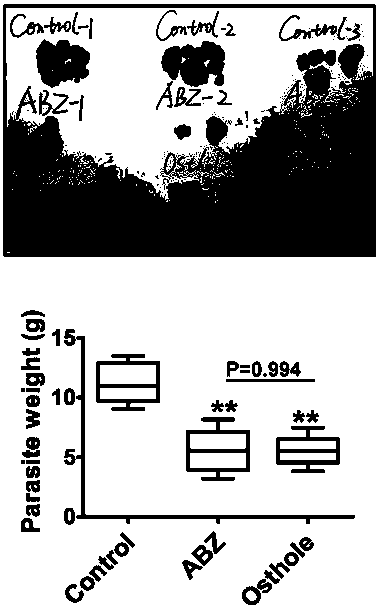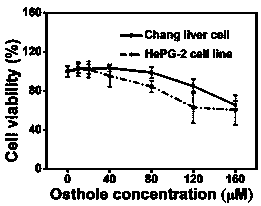Use of osthole in the preparation of medicines for treating echinococcosis
A technology for osthole and hydatid disease, which is applied in the directions of drug combinations, anti-infectives, active ingredients of heterocyclic compounds, etc., can solve problems such as the treatment of echinococcosis by osthole, and achieve the effect of inhibiting growth.
- Summary
- Abstract
- Description
- Claims
- Application Information
AI Technical Summary
Problems solved by technology
Method used
Image
Examples
Embodiment 1
[0023] Effect of osthole on Echinococcus granulosus:
[0024] Purpose and principle: To observe the survival rate of protoscoleum treated with drugs in vitro by trypan blue staining method, so as to observe the effect of drugs on Echinococcus granulosus. Normal living cells have a complete membrane structure, which can repel trypan blue and prevent it from entering the cell; while cells with inactive or incomplete membranes have increased membrane permeability and can be stained blue by trypan blue color. It is generally considered that the integrity of the cell membrane is lost, that is, it is considered dead.
[0025] Method: The cleaned protoscolm of Echinococcus granulosus was added to the 24-well plate, and the control group and the dosing group were set up. Trypan blue staining was used to record the survival rate of the protoscole.
[0026] The protoscole survival rate was calculated according to the following formula: survival rate=(the number of live protoscolums i...
Embodiment 2
[0029] Effect of osthole on anti-hydatid in mice:
[0030] Purpose and principle: To observe the anti-hydatid effect of the drug in vivo by weighing the wet weight of hydatid tissue blocks before and after administration.
[0031] Method: 15 rats were intragastrically administered 100mg / kg per day, and the weight of the tissue pieces was weighed after 6 weeks of administration. Three months after Balb / c female mice were inoculated with hydatid tissues, they were divided into three groups: blank control group, positive control albendazole group, and experimental group osthole group. Each group of five,
[0032] Results and evaluation: if figure 2 As shown, compared with the control group, the wet weight of the tissue block after the action of osthole decreased significantly, indicating that osthole has a good anti-hydatid effect in vivo.
Embodiment 3
[0034] Effects of osthole on cells:
[0035] Purpose and principle: MTT assay was used in the cytotoxicity experiment. The MTT assay is an assay that uses a colorimetric method to indirectly measure the number of viable cells. The detection principle is that succinate dehydrogenase in the mitochondria of living cells can reduce exogenous MTT to water-insoluble blue-purple crystalline formazan and deposit in the cells, while dead cells have no such function. Dimethyl sulfoxide can dissolve formazan in cells, and its light absorption value is measured at a wavelength of 490nm with a microplate reader. Within a certain range of cell numbers, the amount of MTT crystal formation is proportional to the number of cells.
[0036] Method: Add HePG-2 and human Zhang's hepatocytes into 96-well plate, set up control group and drug-dosed group, add solvent in the control group, add osthole with different concentrations in the drug-dosed group, add MTT after incubation for 48 hours, Incub...
PUM
 Login to View More
Login to View More Abstract
Description
Claims
Application Information
 Login to View More
Login to View More - R&D
- Intellectual Property
- Life Sciences
- Materials
- Tech Scout
- Unparalleled Data Quality
- Higher Quality Content
- 60% Fewer Hallucinations
Browse by: Latest US Patents, China's latest patents, Technical Efficacy Thesaurus, Application Domain, Technology Topic, Popular Technical Reports.
© 2025 PatSnap. All rights reserved.Legal|Privacy policy|Modern Slavery Act Transparency Statement|Sitemap|About US| Contact US: help@patsnap.com



